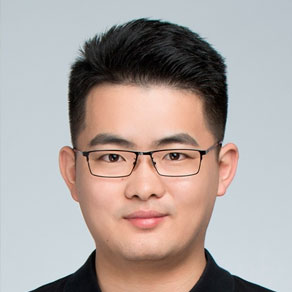
Hao Chen
[introductory/intermediate] Label-Efficient Deep Learning for Medical Image Analysis [virtual]
Summary
Artificial intelligence, especially deep learning with large-scale annotated datasets, has dramatically advanced the recognition performance in many domains including speech recognition, visual recognition and natural language processing. Despite its breakthroughs in above domains, its application to medical image analysis remains yet to be further explored, where large-scale fully and high-quality annotated datasets are not easily accessible. In this lecture, I will cover the fundamental knowledge and recent progress on developing label-efficient deep learning methods by leveraging an abundance of weakly-labeled and/or unlabeled datasets for medical image analysis, with versatile applications to disease diagnosis, lesion detection and segmentation.
Syllabus
- Introduction to medical image analysis (MIA)
- Deep learning basics
- Semi-supervised learning in MIA
- Multi-instance learning in MIA
- Self-supervised learning in MIA
- Active learning in MIA
- Annotation-efficient learning in MIA
- Challenges and future directions
References
Cheplygina V, de Bruijne M, Pluim JP. Not-so-supervised: a survey of semi-supervised, multi-instance, and transfer learning in medical image analysis. Medical image analysis, 2019.
Toennies, Klaus D. Guide to medical image analysis. Springer London, 2017.
Goodfellow, Ian, Yoshua Bengio, and Aaron Courville. Deep learning. MIT Press, 2016.
Dhawan, Atam P. Medical image analysis. Vol. 31. John Wiley & Sons, 2011.
Zhou, S. Kevin, Hayit Greenspan, and Dinggang Shen, eds. Deep learning for medical image analysis. Academic Press, 2017.
Zhou ZH. A brief introduction to weakly supervised learning. National science review, 2018.
Pre-requisites
Machine learning, deep learning and image processing.
Short bio
Prof. Hao Chen is an Assistant Professor at the Department of Computer Science and Engineering and Department of Chemical and Biological Engineering, Hong Kong University of Science and Technology. He leads the SMART Lab focusing on AI for healthcare. He received the Ph.D. degree from The Chinese University of Hong Kong (CUHK) in 2017. He was a postdoctoral research fellow in CUHK and a visiting scholar in Utrecht University Medical Center previously. He has 100+ publications (Google Scholar Citations 13K+, h-index 51) in MICCAI, IEEE-TMI, MIA, CVPR, AAAI, Radiology, Lancet Digital Health, Nature Machine Intelligence, JAMA, etc. He also has rich industrial research experience (e.g., Siemens) and holds a dozen of patents in AI and medical image analysis. He received several premium awards such as MICCAI Young Scientist Impact Award in 2019, Forbes China 30 under 30. He serves as the Associate Editor of journals including Frontiers in Artificial Intelligence, Frontiers in Big Data, Medical Physics, etc. He serves in the program committee of multiple international conferences including Area Chair of MICCAI 2021-2022, ISBI 2022, MIDL 2022 and SPC of AAAI 2022, etc. He also led the team winning 15+ medical grand challenges.




















